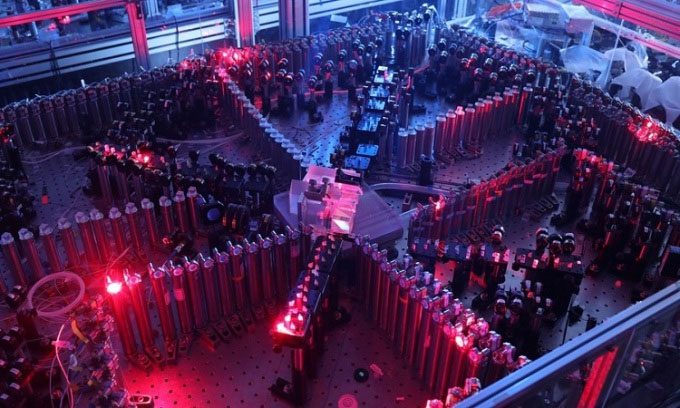China’s latest quantum computer can solve extremely complex problems in one millionth of a second, outperforming the world’s fastest supercomputer by 20 billion years.

The first version of the JiuZhang quantum computer in Hefei. (Photo: Xinhua).
The JiuZhang 3 prototype breaks the record set by its predecessor, achieving a computational speed one million times faster, according to research published on October 10 in the journal Physical Review Letters. The research team, led by Pan Jianwei, a leading scientist in China’s national quantum research program from the University of Science and Technology of China in Hefei, Anhui Province, as reported by the South China Morning Post.
The first Jiuzhang machine, named after an ancient mathematical text, was developed by Pan’s team in 2020. This series of computers utilizes photons, tiny particles that travel at the speed of light, for computation. Each photon carries a qubit, the fundamental unit of quantum information. After increasing the number of photons from 76 to 113 in the first two computer versions, Pan and his colleagues achieved a milestone of 255 in the latest version.
The research team used JiuZhang 3 to tackle a complex problem based on Gaussian boson sampling, simulating the behavior of light particles moving through a crystal maze and mirrors. The problem was initially introduced as a purposeless game, although recent studies suggest that Gaussian boson sampling has applications in encryption technology. In the experiment, researchers stated that JiuZhang 3 solved the problem using the most complex sample set, demonstrating its ability to perform tasks in one millionth of a second. The Frontier supercomputer, the fastest computer developed by the United States and the most powerful in the world as of mid-2022, would take over 20 billion years to complete a similar task.
China, the United States, and several other countries are engaged in a race to achieve “quantum supremacy”, a point at which a machine can outperform classical computers and solve problems beyond the capabilities of traditional machines. However, they employ different methods to reach this goal, and photon processors are just one of several types of quantum computers.
Xanadu, a company based in Toronto, is also developing light-based systems. In collaboration with the National Institute of Standards and Technology (NIST) in the U.S., they introduced the Aurora quantum processor with 216 photons in 2022. However, despite their high speed, these types of machines cannot yet replace traditional computers. Currently, they can only operate for short periods in protected environments for specialized tasks and also suffer from many errors.


















































